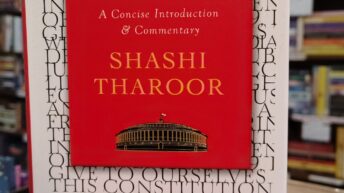
Dr. S. Jaishankar, the present External Affairs Minister of India and a seasoned diplomat, offers a strategic blueprint for India’s foreign policy in his book “The India Way: Strategies for an Uncertain World”. The book presents a nuanced, realist vision grounded in India’s civilizational ethos, adapted to meet the complexities of contemporary geopolitics. It underscores the need for agility, balance, and self-interest for dealing with the evolving global order.
While the book, divided in eight chapters including an epilogue of no less significance, inter alia deals with several aspects of international relations, its principal theme is the emergence of multipolarity. The author notes that the post-Cold War unipolarity dominated by the United States is giving way to a more complex international structure. China’s assertiveness, Russia’s recalibration, the European Union’s internal challenges, and the rise of regional powers have reshaped the global landscape. The book highlights how the old order has drastically changed, whereas a new one is still to take a firm shape. In this context, the author suggests that India must adopt a nimble, multi-aligned approach, cooperating pragmatically across a spectrum of interests without being constrained by ideological blocs.
Further, the book advocates a non-doctrinaire foreign policy. Dr. Jaishankar cautions against rigid alignments or dependency on traditional partnerships. Instead, he proposes a strategy rooted in realism and adaptability, wherein national interest is of paramount importance. The author suggests that India’s foreign engagements should reflect its unique identity, priorities, and civilisational continuity, not merely echo the approaches of other global powers.
A recurring motif in the book is the value of strategic autonomy. This principle, deeply ingrained in India’s diplomatic tradition, is reinterpreted in light of contemporary challenges. The author, armed with a long and diverse experience in the diplomatic, foreign policy and foreign relations circles, argues that while India should retain its decision-making independence, it must simultaneously build issue-based partnerships. In this regard, he cites several examples such as cooperating with the Quad on Indo-Pacific security, with Russia on defence, or with Europe on climate and trade, and goes on to recommend that the nation’s approach should remain flexible and transactional depending on the necessity and requirement of the time as well as issue.
The book has dedicated chapters specifically dealing with India’s relations with China, the United States and Japan. The author stresses the importance of managing China with both clarity and composure. While acknowledging the PRC’s rise and its implications, he warns against either confrontation or appeasement. Instead, he calls for steady diplomatic engagement, military preparedness, and regional coalition-building to uphold rules-based order in Asia. The author presents a non-biased practical approach to India’s relations with China while at the same time acknowledging the issues that mar it, issues which cannot be ignored and covered under the table.
Regarding the United States, the author views the partnership as vital but evolving. India must deepen strategic cooperation while preserving its policy independence. He notes the increasing convergence between New Delhi and Washington, particularly in the domains of technology, security, and democratic values (at least in theory), but insists on preserving mutual respect and requiring reciprocity.
So far as India’s relationship with Japan and the Asian balance are concerned, the author holds them to be highly valuable and of utmost importance, given not just the past but also geographical and value-based alignment. The book highlights how Japan has played a significant role in the realisation of infrastructural projects such as the Metro rail networks that have a long-standing impact on overall development in India. The book suggests that the Indo-Japan ties hold a still unfulfilled strategic potential which must be harnessed, especially for shaping a multipolar Asian order. The book also contains a dedicated chapter on India’s maritime potential and the need and relevance of achieving it.
Many will be interested in the author’s perspective on India’s relations with Pakistan, a problematic neighbour responsible for several incidents of terrorism, wreaking havoc on lives, property and peace in India. Jaishankar suggests a calibrated and realist approach to that country. He subtly underscores the futility of engaging with a hostile power that persistently employs cross-border terrorism as an instrument of state policy, and he critiques the historical naiveté implicit in India’s earlier diplomatic overtures to the said state.
The book also underscores India’s civilisational identity as a source of strength. The author invokes historical diplomacy from the Mahabharata to Kautilya’s Arthashastra to highlight India’s long-standing strategic culture. This cultural confidence enables India to speak with authenticity on global issues, bridging divides between North and South, East and West. The author adroitly uses the Mahabharata as a prism to describe the ambiguities which have influenced the Indian leadership’s mind time and again on issues of strategic importance. He suggests that there is an immediate need to forge alliances based on strategic interests, even if they are uncomfortable. India cannot shy away from taking calculated risks while honouring a rule-based order.
Lastly, “The India Way” calls for domestic transformation to complement external engagement. Economic resilience, technological capability, and social cohesion are seen as prerequisites for effective diplomacy. India’s global stature must rest on internal strength and reflect a coherent strategic vision.
In sum, Dr. S. Jaisankar’s book “The India Way” is a call for calculated pragmatism, drawing from tradition while adapting to contemporary realities. It may be utilised as a guide for diplomats to think beyond binaries, champion sovereignty, and project India as a self-confident, constructive, and consequential power in an uncertain world. The book expands and clarifies thoughts and perspectives, and pushes readers to reconsider the usual dogmas.






Add comment